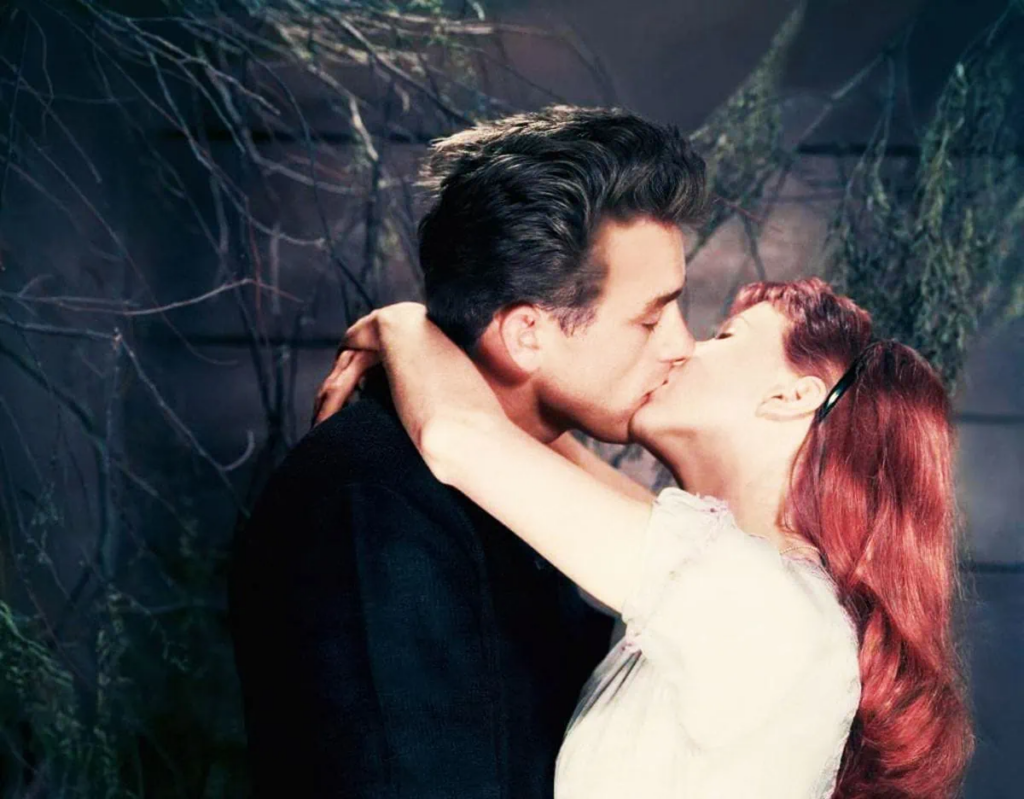
EAST OF EDEN (director: Elia Kazan; screenwriters: from the novel by John Steinbeck/Paul Osborn; cinematographer: Ted McCord; editor: Owen Marks; music: Leonard Rosenman; cast: James Dean (Cal Trask), Julie Harris (Abra), Burl Ives (Sam the Sheriff), Raymond Massey (Adam Trask), Jo Van Fleet (Kate), Richard Davalos (Aron Trask), Albert Dekker (Will Hamilton), Timothy Carey (Joe), Harold Gordon (Gustav Albrecht); Runtime: 115; MPAA Rating: NR; producer: Elia Kazan; Warner Bros.; 1955)
“Kazan had the bad sense to leave out the best parts from the lengthy book.”
Reviewed by Dennis Schwartz
Elia Kazan (“Baby Doll”/Pinky”/”America, America”) directs James Dean in his first starring role, in this overwrought biblical themed melodrama (revisiting the Cain and Abel story and updating it for modern times) that’s adapted from a John Steinbeck novel and written by Paul Osborn. Kazan had the bad sense to leave out the best parts from the lengthy book, covering only the final chapters of the book. It holds up mostly as a curio spectacle through Dean’s uncanny ‘love it or hate it’ Brando-like performance, where he shows off his tics and how hurtful he is as the misunderstood teen over the rejection by his stern Bible-thumping rancher father Adam Trask (Raymond Massey). Dean plays the confused, cranky and immature self-absorbed twit we are supposed to empathize with about how “it’s awful not to be loved.” His stagy performance is all histrionics and all about “himself;” why Dean’s cornball flashy performance was so lauded is beyond my comprehension, as it’s outdated by today’s standards and his supposed sensitivity left me as cold as the film did.
The condensed film version of the book is set in northern California in 1917. Respected and successful rancher Adam Trask has moved to the town of Salinas, California with his high school aged twin sons, Caleb (James Dean) and Aron (Richard Davalos, his film debut), whom he named after Biblical characters. The brothers have opposite personalities, one being good the other bad. Cal is a neurotic who is obsessed that he’s bad and takes after his long departed mother. Aron is the well-adjusted pious one, who is his father’s favorite. Cal is jealous of his good brother and pines for his devout father’s love, and acts bad when this love is repeatedly denied.
Adam told the boys that their mother died after they were born, but really thinking she left him to go east. A former worker on Adam’s ranch tells Cal his mom is a madam in a whorehouse in nearby Monterey. Cal meets his mom in the bordello, and later tells his dad. Adam seems surprised that she’s nearby, and tells his son not to tell his brother because the news will upset him.
In the meantime, Adam believes through refrigeration his lettuce crops could be transported east by train. But his experiment fails as a snow slide stalls the train and the ice melts. This causes Adam to lose everything. To help him, Cal borrows $5,000 from mom and partners with his father’s trustworthy friend Will Hamilton (Albert Dekker) to raise beans–a crop that will be highly valued if the war that’s expected materializes for America.
Aron’s sweet countrified girlfriend Abra (Julie Harris) is frightened of Cal because of his peculiar behavior, but forms a bond with him after he rescues her at a carnival from the unwanted attentions of a soldier. She is struck by his good looks and identifies with him because of her troubled relationship with her own father, and tries to act as his savior.
In the climactic scene, the priggish Adam refuses Cal’s attempt to buy his love with the fortune he made from beans, and in a fit of jealousy at this latest rejection Cal drags his brother to meet mom. This causes the shocked goody-goody to go on a drunken binge and enlist, somehow shipping out the same night (if you believe). The grief-stricken father rushes to the train station and the contemptuous Aron in a drunken stupor doesn’t acknowledge him, and Adam has a stroke. On his dying bed, Cal at last gets some love from pop and wins the heart of Abra.
None of the dramatics were convincing, that includes the hammy and unnatural performance by Dean that elicited no particular emotional feelings from this viewer as his act seemed to be just that. Kazan’s exterior visuals were never interesting (except for the ice house shots) and his direction was heavy-handed. But the worst part of the film might be the dreary noxious score by Leonard Rosenman. Though Dean emerged as an overnight sensation, it was Jo Van Fleet who won a supporting actress Oscar even though her role as the bitter bitch was far too theatrical for my taste; but at least she had the film’s best line when she tells Cal how hilarious it is that her prostitution money is going to ironically help her self-righteous ex-husband: “If you don’t think that’s funny, you better not go to college.”
REVIEWED ON 12/3/2007 GRADE: C+
© ALL RIGHTS RESERVED DENNIS SCHWARTZ